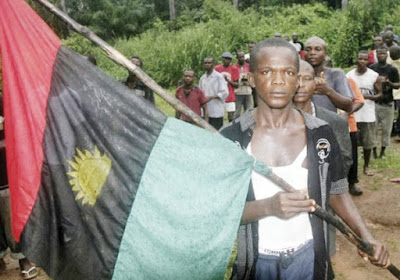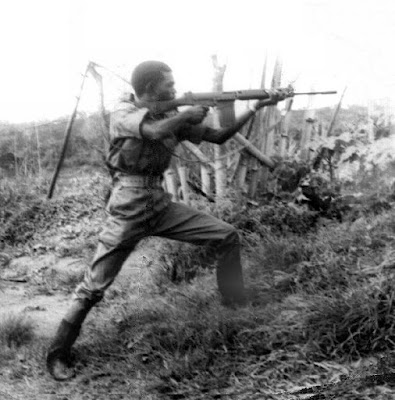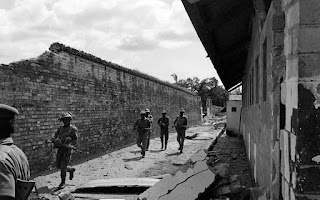Biafra's Fresh Wounds
 By Tolu Ogunlesi, 234NEXT
By Tolu Ogunlesi, 234NEXTForty years ago today, the Nigerian civil war (also known as the Biafran War) came to an end with the formal acceptance of the Republic of Biafra's surrender documents by Olusegun Obasanjo, then a colonel, on behalf of the Nigerian government.
On the afternoon of the previous day (12 January), Philip Effiong, a general, who took over the leadership of the Biafran Government after Odimegwu Ojukwu, also a general, went into exile in Cote d'Ivoire, had announced that he was pulling his troops out of the war. "I am convinced that the suffering of our people must be brought to an immediate end. Our people are now disillusioned, and those elements of the old government regime who have made negotiations and reconciliation impossible have voluntarily removed themselves from our midst. I have, therefore, instructed an orderly disengagement of troops," Mr. Effiong said.
The war started in July 1967, when the Nigerian government invaded the Republic of Biafra, in a bid to prevent it from carrying out its vow to secede. Mr. Ojukwu, military administrator of Nigeria's Eastern region (which transformed into Biafra) had declared secession on May 30, 1967, in response to the mass killings of Igbos which started in Northern Nigeria in July 1966. By the end of the war, about one million persons, mostly Igbos, were estimated dead.
The war was also characterised by widespread starvation; with the photos of kwashiorkor-stricken children that found their way out of Biafra eliciting a significant humanitarian reaction from around the world. The founding of the humanitarian organisation Médecins Sans Frontières (Doctors without Borders) in 1971 by a group of French doctors who had worked in Biafra is believed to have been inspired by the war.
A story of loss
For many persons of Eastern Nigerian origin who lost family and loved ones to the war, the wounds of the war are fresh as ever, forty years on. The novelist Chimamanda Adichie, whose award-winning second novel, Half of a Yellow Sun, is set during the war, lost both grandfathers to the war. "It is a personal issue - my father has tears in his eyes when he speaks of losing his father, my mother still cannot speak at length about losing her father in a refugee camp," she recalled in an interview shortly after the novel was published.
Paris-based filmmaker Newton Aduaka recalls that the war made him "a very insecure child." Relocating to Lagos from Eastern Nigeria after the war was like "starting all over again". He also believes that the war is "a very misunderstood story... it [wasn't] about Nigerians against Nigerians, this was a very divisive war from outside of Nigeria, an extension of colonialism; we were pawns within a bigger game that we didn't understand."
The ‘small' against the ‘big'
Finnish political scientist Mai Palmberg saw the war from the outside. She was a young student then, in a region of the world (Scandinavia) with a strong awareness of the conflict, as well as a lot of sympathy for the Biafrans. "[Biafra] was seen as the Christian part (not entirely correctly, but still) of Nigeria; it was the small nation against the big and ruthless one, and those pictures of children with Kwashiorkor moved people deeply. Perhaps it also mattered that both the Soviet Union and UK supported the federal government," she wrote in an email to NEXT.
France was Biafra's biggest Western supporter, providing weaponry and relief supplies. Carl Gustaf von Rosen, the mercenary fighter pilot who gained worldwide fame flying relief supplies into Biafra, as well as leading bombing missions into Nigerian territory, was Swedish. Ms. Palmberg says von Rosen was "treated as a hero" in Scandinavia. And in 1969, a protesting Finnish priest sprayed the word ‘BIAFRA' on the wall of Helsinki's iconic Temppeliaukio Church, during its construction.
A new Biafra?
Forty years on, resentments still exist amongst many Igbos. In a 2008 interview, Ms. Adichie lamented Nigeria's attitude to the war. "You're told that a war happened and nothing else. Igbo people have a sense that we're supposed to pretend nothing happened," she complained.
In recent years the agitation for Biafra has resurfaced, amidst a wave of ethnic nationalist movements that emerged with the dawning of a new democratic dispensation in 1999. Only months after the government of Olusegun Obasanjo came into office, the Movement for the Actualisation of the Sovereign State of Biafra (MASSOB) was founded by Igbo lawyer Ralph Uwazuruike.
Mr. Uwazuruike said his sister died in his arms during the war. According to him, his founding of MASSOB was "for the general interest of my people and for the emancipation of Ndi'Igbo from the slavery status in Nigeria." He has also said that President Obasanjo's failure to appoint Igbos into prominent positions in his cabinet in 1999 further inspired the formation of the movement.
On May 22, 2000, in Aba, Abia State, he announced the creation of "new Biafra" and hoisted the Biafran flag. "MASSOB shall commence the establishment of necessary structures that may sustain the sovereignty of the new Biafra State, if after 30 days from today the Federal Government of Nigeria fails to initiate the expected negotiations," he said.
A resilient cause
This position has been echoed over the years, despite a series of government clampdowns. "Biafrans have chosen to stay on our own as an independent sovereign state to ascertain the yearnings and aspirations of over forty million Biafrans," said Uchenna Madu, the MASSOB director of information, in July 2004.
The organisation marked its tenth anniversary last year with a series of civic and religious events. It has often said that its campaign is a non-violent one. During the tenth year anniversary, a senior official was quoted as saying that "kidnappers carry guns while we don't."
MASSOB's sentiments are not peculiar to the movement. Kazeem Badmus, national vice president of the Frederick Fasheun faction of the Oodua People's Congress (easily the Yoruba equivalent of MASSOB) is in full support of the decision of the Igbos to go to war. "They were fighting for their rights," he told NEXT in a telephone chat. "You cannot go to the market to buy power or independence, you have to fight for it."
The rising sun
On January 15 1970, Nigerian Head of State Yakubu Gowon, in his victory speech to the country, declared that, "the so-called Rising Sun of Biafra is set for ever. It will be a great disservice for anyone to continue to use the word Biafra to refer to any part of the East Central State of Nigeria. The tragic chapter of violence is just ended. We are at the dawn of national reconciliation. Once again, we have an opportunity to build a new nation."
Forty years on, there is no consensus on whether that new nation has seen the light of day.



Comments